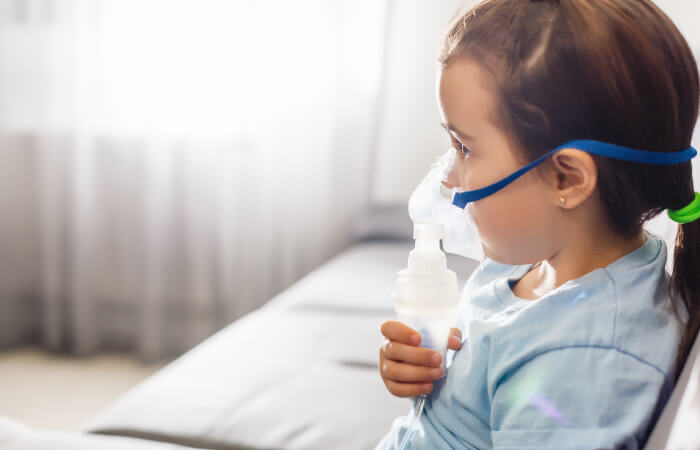Cystic Fibrosis Center
The Cystic Fibrosis Center (CF Center) at HSHS St. Vincent Hospital is dedicated to providing exceptional care to patients and families with cystic fibrosis (CF).

Cystic Fibrosis Specialists
At the HSHS St. Vincent Hospital CF Center, we have an adult CF specialist and a pediatric CF specialist. They are responsible for many aspects of your care, including regular physical examinations, managing medications and other treatments, and ordering/analyzing appropriate lab/diagnostic tests. They provide inpatient and outpatient care and will refer you to other medical specialists if/when necessary.

Experienced CF Nurses
The CF center nurse is an excellent resource, especially if your doctor is away or is unavailable. CF center nurses help direct you to the appropriate resource within the CF center team if you have questions or concerns regarding your care.
There is also a clinic nurse who works directly with CF physicians at their clinic. You will see both nurses at the CF center and your doctor’s clinic as they work together to ensure consistent scheduling of appointments, access to sick visit appointments, ordering of medications and follow-up on diagnostic testing.

Genetic Counseling
Genetic counselors work with families in the CF Center to help them understand genetic information in a personally meaningful way. Genetic counselors provide support and resources for families throughout many stages of their lives. They address questions about genetic testing, CF inheritance, and likelihood for other children or relatives to have CF or to be a CF carrier. They also coordinate genetic testing for families and help them gain access to relevant clinical trials. The genetic counselors are dedicated to quality CF care.

Physical Therapy
Physical Therapy is part of your team in the CF Center. Regular exercise helps your overall health because it promotes heart and muscle function, which builds strength and gives you energy to live an active life. It is also important for your health with CF because it can help improve your ability to cough mucus out of your airways, which is critical for better lung function.
Your physical therapist will work with you to design an exercise or fitness program that is based on your age, health status and include sports or other physical activities that you enjoy doing in order to maintain lung function and a generally good physical fitness level.
You can also work with your CF physical therapist on ways to maintain a good posture, build or regain muscle strength, and endurance through various techniques to improve your mobility and lung function. They can also help you address embarrassing issues such as urinary incontinence.
What is included in a physical therapist visit in the CF Center?
- Discuss current daily activity levels appropriate for child’s age.
- Complete exercise testing as appropriate.
- Discuss any musculoskeletal concerns and check postural alignment, range of motion, and strength.
- Screen for any developmental delays and assist with any activities or refer as appropriate.
- Generate referral to outpatient therapy services if further therapy is needed.
- Develop an individualized exercise/activity program that works best to encourage daily activity as recommended by the Cystic Fibrosis Foundation.
- Discuss any other concerns related to activity, weakness, development, pain, posture and urinary incontinence.

Registered Dietitian
Achieving optimal nutrition status is imperative for patients with CF to maintain good lung health. A registered dietitian will be available to help determine the appropriate medical nutritional therapy necessary to assure sufficient energy and nutrient intake to achieve optimal growth in children and weight stability in adults. The dietitian will review dietary intake and monitor growth patterns (height, weight, weight for length and BMI) closely at every visit to help identify specific methods to more efficiently meet nutritional goals to achieve desired growth patterns/weight stability as recommended per the Cystic Fibrosis Clinical Nutrition Care Guidelines.
Medical nutrition therapy is tailored for each patient to help nurture success. Along with review of dietary intake and growth patterns, the dietitian will also address the following:
- Adjust/monitor pancreatic enzymes to minimize gastrointestinal symptoms/optimize growth.
- Develop methods to increase nutrient density of foods or provide supplemental nutrition (including use of oral nutrition supplements and/or tube feedings) to optimize growth.
- Assess food security issues and discuss community options for food procurement (in conjunction with team social worker).
- Assess social barriers impacting nutritional status and make referrals as necessary (in conjunction with team social worker).
- Identify/manage the nutrition plan of care for patients with Cystic Fibrosis Related Diabetes.
The Cystic Fibrosis Dietitian, along with the other members of the Cystic Fibrosis Team, is committed to providing the best nutrition plan of care for each patient.

Registered Pharmacist
Education is an important role of the pharmacist. The more a person knows about the medication they are taking, the more likely they are to take it properly and get the maximum benefit from it. The person with CF should know the name and dosage of their medications, why the medication is prescribed, how it works and what to do if side effects occur. This is a family affair until the person with CF can handle their medications on their own.
The CF Center pharmacist may also help with antibiotic selection, dosing, monitoring and interpreting drug levels when necessary. The pharmacist educates the entire pharmacy at HSHS St. Vincent Hospital about the care of persons with CF. This includes information about available medications and treatments and those that are in the development pipeline.

Respiratory Therapy
The respiratory therapist (RT) will help you find ways to fit your chest physiotherapy, exercise and aerosolized treatments into your daily routine. The respiratory therapist will be available to teach you various modes of mucus clearance, introduce and trial any additions or changes to your prescribed nebulized medications, and review the best way to maintain your respiratory equipment.
The respiratory therapy department provides a full range of cardiopulmonary therapeutics for children, adolescents, and adults in both inpatient and outpatient settings. The department is staffed 24-hours a day.
Services include:
- Mechanical ventilation
- Noninvasive monitoring
- Oxygen administration
- Aerosolized drug delivery
- Postural drainage/percussion and vibration
- Other airway clearance techniques
- Cardiopulmonary Function Testing
- Cardiopulmonary Rehab
- Bronchoscopy
- Referral Requirements

Social Workers
The CF Center social worker is available to assist families in managing this stress by partnering with them to find solutions. The social worker is present at clinic visits, during hospital stays, and weekdays by phone to provide resource information, emotional support, answer questions about life issues, and make appropriate referrals.
The social worker helps in the transition process from dependence on caregivers to independence in CF care, goal-setting, and education and/or career planning. The social worker also works with the team to transition those patients moving from the pediatric care team to the adult care team as they grow from teens to young adults.
The social worker performs routine psycho-social assessments in order to assist the team in providing comprehensive care to those who have been affected by CF.